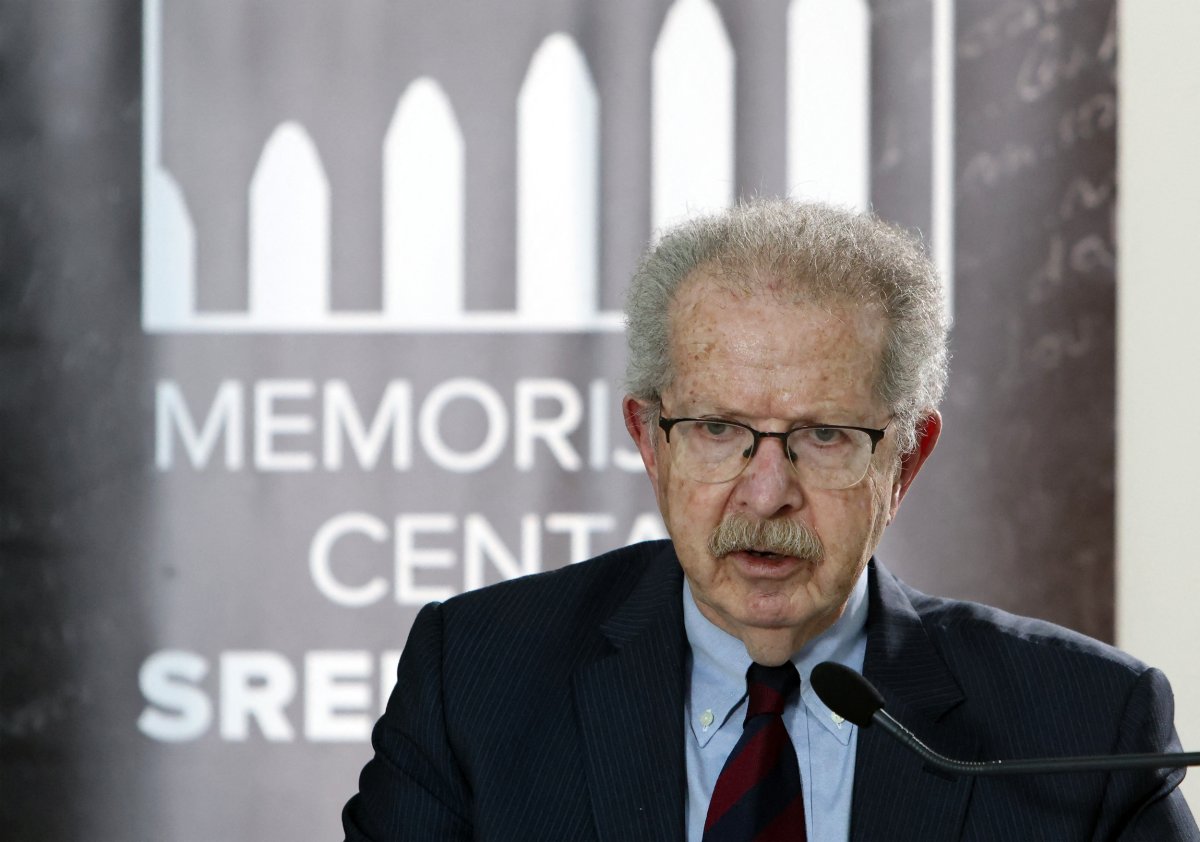On Jan. 27— International Holocaust Remembrance Day, marking the 79th anniversary of the liberation of the Nazi death camp of Auschwitz-Birkenau—the grand mufti of Bosnia and Herzegovina, his Eminence Hussein ef. Kavazović and I issued a set of principles for Muslim-Jewish—but in truth, for any and all—interfaith dialogue.
We did so at a time when our respective communities around the world are drifting farther and farther away from each other, all too often set against one another by political and religious leaders intent on stoking the flames of hatred and paranoia.
We did so at the Srebrenica Memorial Center in Potočari, Bosnia, the site of the July 1995 Srebrenica genocide in which Bosnian Serb ultranationalist paramilitary thugs murdered thousands of Bosniak—that is, Bosnian Muslim men and boys—raped and violated Bosniak women and girls, and forcibly deported more than 25,000 women, children, and the elderly from what was supposed to be a safe area under United Nations protection.

We did so in the shadow of the savage attack on the Israel-Gaza border on Oct. 7, in which Hamas terrorists murdered more than 1,200 Jews, raped and violated women and girls, and violently kidnapped more than 200 hostages into Gaza, more than 100 of whom remain captive in horrific conditions almost four months later.
We did so in the shadow of the Israel-Hamas war, launched by Israel to remove the existentialist threat posed by Hamas whose charter calls for the destruction of the State of Israel, and which has resulted in the death, displacement, and suffering of thousands of innocent civilian Palestinian men, women, and children in Gaza.
We did so because the Holocaust, the Srebrenica genocide, and all other genocides and related manifestations of crimes against humanity are the culmination of ideologies premised on the abhorrent proposition that one group of human beings is superior to another.
We did so because we are united in our adherence to tolerance and mutual respect as the underpinnings of any viable future for our human family.
We did so because far too many strident voices on both sides of the increasingly widening divide between Muslims and Jews are fomenting hatred and espousing bigotry.
Religion can be a source of comfort, faith an instrument of healing. But fundamentalist religious zealotry and fanatical political beliefs are also far too often instruments of destruction that drive nations and faith communities farther and farther away from one another.
Instead, the grand mufti and I hope that our dialogue principles will, if adopted by others in the international community, provide a moral and political common ground that can bring nations and faith communities closer together in a spirit of tolerance.
These principles, intended to be a beacon guiding our joint commitment to a future where understanding and coexistence can overcome hatred, fear, and war are:
- Repudiation of all forms of Antisemitism, Islamophobia, and other Bigotries: We commit ourselves to publicly repudiating, condemning, and fighting against all manifestations of antisemitism, Islamophobia, xenophobia, and other bigotries, and all forms of racial, ethnic, religious, or national hatred. We undertake never to remain silent when men, women, and children are murdered, tortured, raped, taken hostage, or targeted for destruction because of their racial, ethnic, religious, or national identity, and we further undertake to repudiate and condemn any glorification or attempted rehabilitation of the perpetrators of such acts.
- Unyielding Dedication to Protecting Life: We are steadfast in our commitment to safeguarding civilian lives. We deplore the loss of life and horrors inherent in all wars and armed conflicts and pray for peace for all of humankind. At the same time, we are mindful that nations have the obligation to defend and protect their citizens and to prevent genocides, crimes against humanity, war crimes, and other atrocities. Our collaboration will actively involve securing external support and intervention when needed, with the prime objective of protecting the innocent and vulnerable amidst conflict, including the ongoing and future ones.
- Freedom of Expression Within a Framework of Respect: We uphold the right of leaders from our communities to voice their concerns and perspectives freely as long as they do so in an atmosphere of mutual respect and tolerance without engaging or acquiescing in hate speech of any kind. Such open expression is vital to fostering understanding and shall not hinder our ongoing dialogue but rather enrich it, creating a foundation of trust and mutual respect.
- Consistent, Compassionate Communication: We pledge to maintain consistent and compassionate channels of communication, understanding that empathy and mutual respect are key in navigating and building lasting peace.
- Collaborative Efforts in Times of Crisis: In moments of crisis, we stand together, pooling our resources, knowledge, and strategies. Our joint efforts will extend to crisis management, peacekeeping, and recovery operations, ensuring robust support and protection for our communities.
We are not so naive as to believe that these principles will be a panacea or that the international community will embrace them with open arms. But perhaps, just perhaps, they can form the beginning of a conversation.
Perhaps, just perhaps, they can keep a Muslim child, or a Jewish child, or a Christian child, or a Buddhist or Sikh or Hindu child, from being killed. Perhaps, just perhaps, they can move the needle even a millimeter toward a semblance of if not yet peace than perhaps at least, peaceful coexistence.
Menachem Z. Rosensaft is Adjunct Professor of Law at Cornell Law School where he teaches about antisemitism in the courts and in jurisprudence and about the law of genocide. He is the author of Poems Born in Bergen-Belsen (Kelsay Books, 2021)
The views expressed in this article are the writer's own.
Uncommon Knowledge
Newsweek is committed to challenging conventional wisdom and finding connections in the search for common ground.
Newsweek is committed to challenging conventional wisdom and finding connections in the search for common ground.
About the writer
To read how Newsweek uses AI as a newsroom tool, Click here.








